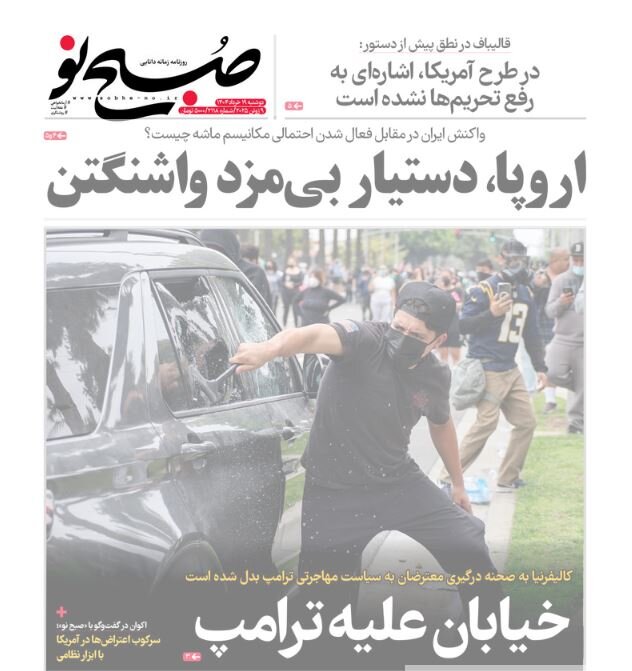Grossi admits Iran's technical capabilities and the futility of a military option

TEHRAN - In a note, Sobh-e-No addressed Rafael Grossi's statements about Iran and wrote: On the sidelines of tensions between Iran and the Agency (IAEA), Grossi made meaningful statements in an interview with Western media: "I am optimistic about indirect negotiations between Iran and the United States.
Iran's nuclear capabilities cannot be destroyed by a military attack. Iran's most sensitive sites are located half a mile underground and are very difficult to access." These sentences are a clear admission about Iran’s advances in nuclear technology and the futility of threatening options against it. However, Tehran is trying to overcome political pressures and maintain the technical path of cooperation with the Agency. Considering the regional conditions, developments in Iran-U.S. relations, and Tehran's insistence on guarding its nuclear technology, the outlook for negotiations in the coming months will be extremely complex and sensitive. Finally, as the Leader of the Islamic Revolution has repeatedly emphasized, the country's national interests and independence should not be sacrificed, and the advancement of Iran's nuclear technology will remain part of the honorable and unstoppable path of the Islamic Republic.
Arman-e-Melli: Last effort to abort an agreement
In an analysis, Arman-e-Melli addressed the movements of hardliners at home against the nuclear negotiations. It quoted former parliamentarian Kamaleddin Pirmoazen, who says: It seems that Iran and the United States have become closer than ever before to reaching an agreement in their negotiations. As we have experienced in recent years, foreign policy movements have little to do with domestic policy, and decisions in this area are implemented under the supervision of the Leadership. However, we continue to see some inside Iran, who have a history of extremism toward the JCPOA, point to issues that are not only repetitive but can also divide the voice of unity within Iran in dealing with the United States. This group does not allow any government to negotiate. This extremist group is always looking for a tense atmosphere, and now they have put the same issue on the agenda. These extremist figures are always looking for bipolarity in the Iranian political scene, and even if the government is reformist, they increase their opposition without thinking about national interests or caring about the future.
Kayhan: Iran changed the regional equations
In an article, Kayhan examined Iran's infiltration into the Zionist regime's security structures and said: In one of the most complex and largest intelligence operations in recent decades, the Iranian Ministry of Intelligence succeeded in dealing an unprecedented blow to Israel's security structures and obtaining thousands of security and intelligence documents regarding the actions and nuclear centers of the usurping Zionist regime. While the world's media outlets are reflecting the dimensions of this extraordinary intelligence operation one after another, what has caught the eye the most is Iran's dominance over the hidden layers of the security systems of a regime that considered itself impenetrable for decades. In addition, the achievement of this operation is a strong political, security, and psychological slap in the face of the Zionist regime and its Western supporters. It is not without reason that the Tel Aviv regime is stunned and has adopted silence. Zionist analysts are concerned that this revelation is only the beginning. According to the Yedioth Ahronoth newspaper, the leaked intelligence documents have not yet been published, and speculation is ongoing about Iran's next goals.
Iran: Impact of possible dissolution of the Netanyahu cabinet on nuclear talks
In an explanation, the Iran newspaper addressed the possible breakup of the Netanyahu government and its impact on the nuclear talks between Iran and the United States. It wrote: One of the opponents of the indirect nuclear talks between Iran and the United States was Israel, particularly Netanyahu. Experience has shown that in election years, due to the lack of a majority coalition in parliament, Netanyahu has revived his voter base by making his decisions more radical. It can be predicted that if we witness the collapse of his coalition government and a new election, Netanyahu, unburdened by the need to maintain the coalition and coordinate with the cabinet, will likely adopt a more destructive course regarding the Iran case and the nuclear issue. Although a direct attack on nuclear facilities is unlikely, the political situation following the dissolution of the cabinet may compel Netanyahu to be more adventurous and increase sabotage efforts. In conclusion, we can say that if the Knesset votes to dissolve the cabinet and heads toward new elections in the occupied territories, we can expect more adventures from Netanyahu.
Leave a Comment